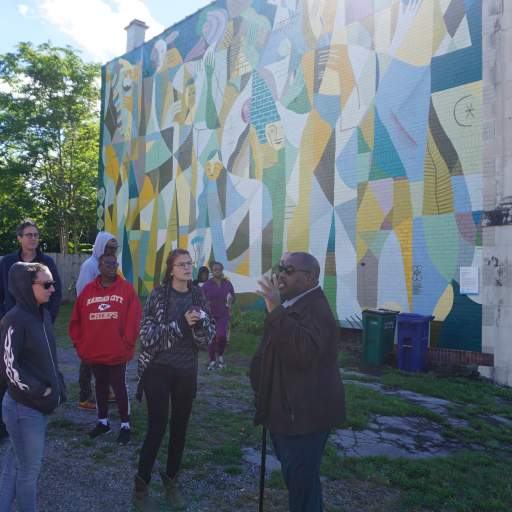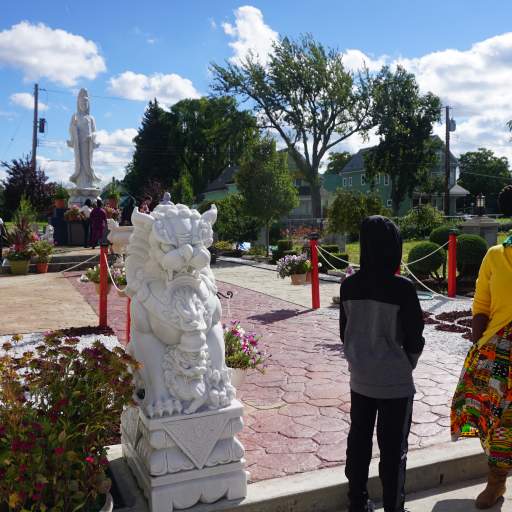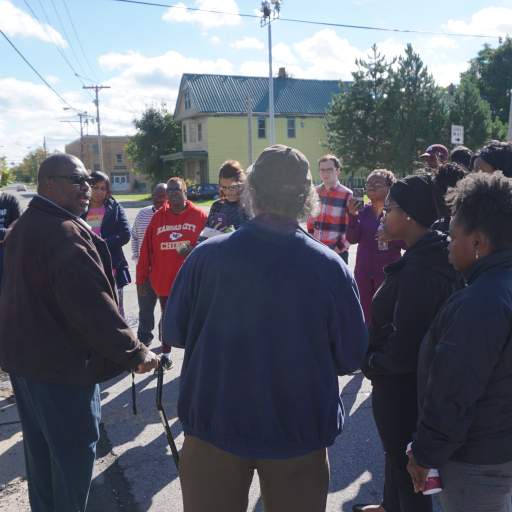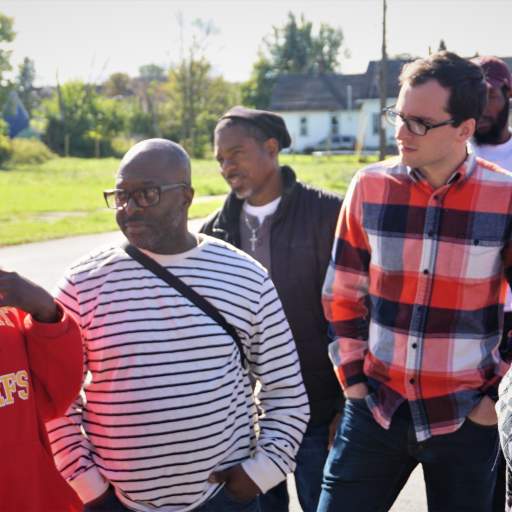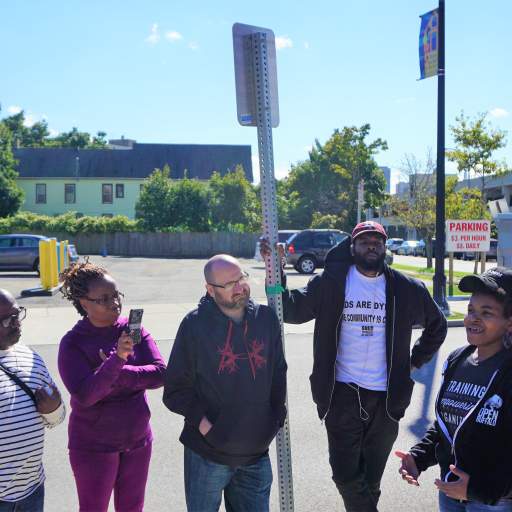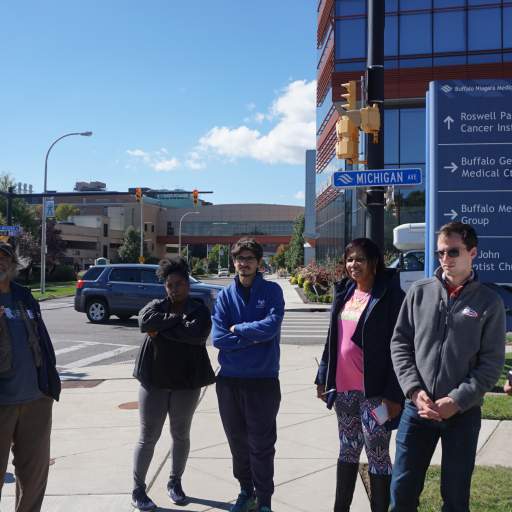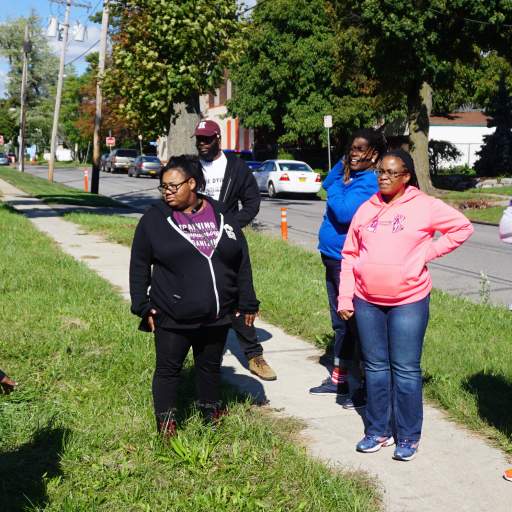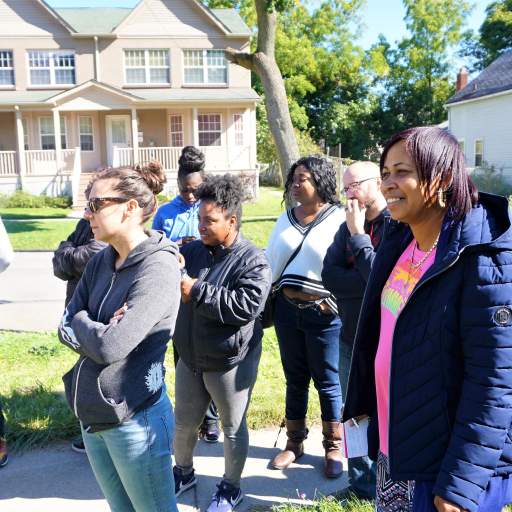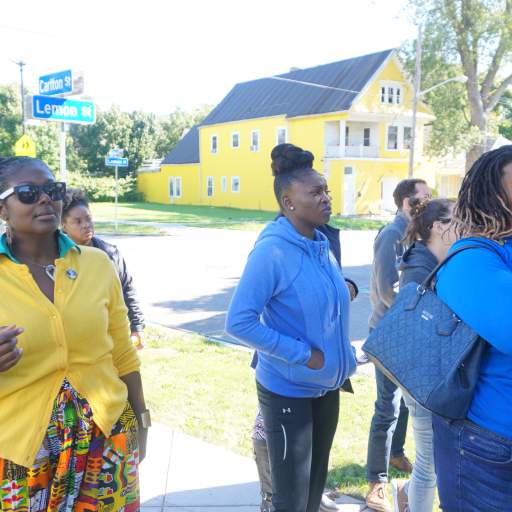
Ecological Justice
Learning on the Move: Emerging Leaders’ Buffalo Bus Tour
Published October 1, 2018
By Monica Wrobel
On a Saturday morning in September, Open Buffalo’s Emerging Leaders boarded a bright yellow school bus, trading the classroom for an opportunity to learn about the city on the road and on foot. Exploring Buffalo’s diverse neighborhoods, the group encountered both assets and challenges within our city. Along the way, they met with community leaders who are truly ‘walking the walk’ to enact social change.
To guide the tour, Open Buffalo was fortunate to have Sam Magavern, Executive Director of Partnership for the Public Good. Throughout the day, Magavern provided well-researched commentary on the intersecting stories of our city’s people, places, and politics. Far from a one-sided lecture, Emerging Leaders entered the conversation as co-educators, contributing their own knowledge of local organizations and populations. This dialogue of lived realities and historical context helped participants to experience striking economic and racial disparities in Buffalo that demand a community-led response.
Starting on Buffalo’s East Side, Emerging Leaders spoke with Mike and Marva Threat from Greater East Side Fields of Dreams Block Club. As the group walked the streets of the Broadway Fillmore area, the Threats pointed out empty lots where houses once stood: visible signs of disinvestment that altered the predominately Black neighborhood over the years.
For Emerging Leader Jalonda Hill, it was troubling to see “there is not one single library in the Broadway Fillmore district.” In her mind, the absence of libraries reflects systemic racism that deprives people of color from access to key institutions for culture and education. The Threats are acutely aware of the need for better community assets, dedicating the block club as a space for residents to come together and challenge the status quo.
En route to the next destination, the Emerging Leaders learned more about landmarks that have shaped the downtown area, for better or for worse. Traveling on the NY 33, the group discussed the expressway that divided the East Side, with devastating impact on the communities of color that live and work there. As they learned, the exacerbation of economic and racial inequality was not just an accident of the expressway’s construction, but part of its very design.
“Sam talked about how far the construction workers dug down into the ground … so that the people coming into the city did not have to view the surrounding neighborhood as they ventured in,” recalled Emerging Leader Arnester Vanoy. “I was flabbergasted.”
While these examples of displacement reveal enduring injustices for many citizens of Buffalo, the group also discovered how to use knowledge as power for change. Open Buffalo’s own India Walton gave powerful testimony to how her education on systemic inequality moved her to organize resistance and reform in her community. Guiding the Emerging Leaders through the Fruit Belt, Walton pointed out how the new Buffalo Niagara Medical Campus does not equally benefit the surrounding neighborhood. Rather, concerns including displacement and gentrification became so pervasive that the residents determined a need for collective action. The hard-earned progress of F.B. Community Land Trust, especially a recent win of two lots to become community-owned, inspires Walton to carry on the fight for grassroots community empowerment. She shared her motivation, reflecting, “The more you face the impossible, the less impossibility seems like a reality.”
Certainly, this motivation has fueled movements of change on Buffalo’s West Side. Stopping by organizations like the Massachusetts Avenue Project, the WASH Project, and PUSH Buffalo, the Emerging Leaders witnessed innovative solutions that prioritize neighborhood well-being for both long-time residents and immigrant newcomers. Whether addressing access to healthy food, cultural arts, or sustainable and affordable housing, these organizations integrate the voices of people too often disregarded by mainstream narratives. Their investment in communities’ needs and dreams exemplifies how Buffalo can build assets that are truly inclusive of all people who call our city their home.
For the Emerging Leaders, the tour was a true reminder of how the history of Buffalo’s built-environment continues to impact the present struggles of city residents most directly impacted by injustice. As Emerging Leader TuWanner Cleveland remarked, “We can’t afford to wait until it comes to our doorstep. … We are all responsible to organize ourselves for our communities.”
